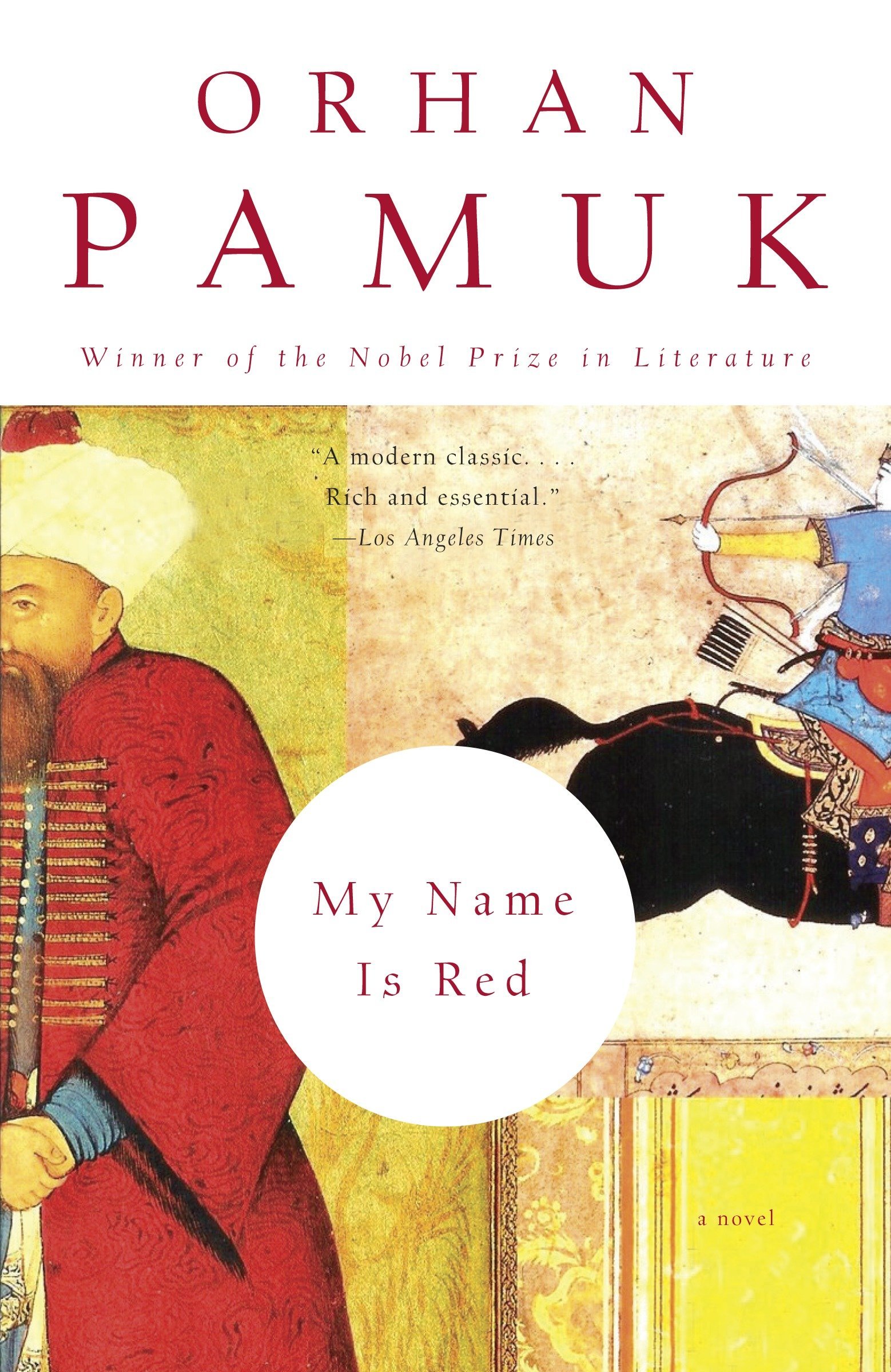My Name Is Red
My Name Is Red (Turkish: Benim Adım Kırmızı) is a 1998 Turkish novel by writer Orhan Pamuk translated into English by Erdağ Göknar in 2001. Pamuk would later receive the 2006 Nobel Prize in Literature. The novel, concerning miniaturists in the Ottoman Empire of 1591, established Pamuk's international reputation and contributed to his Nobel Prize. The influences of Joyce, Kafka, Mann, Nabokov and Proust and above all Eco can be seen in Pamuk's work.
The French translation won the French Prix du Meilleur Livre Étranger and the Italian version the Premio Grinzane Cavour in 2002. The English translation, My Name Is Red, won the International Dublin Literary Award in 2003.
In recognition of its status in Pamuk's oeuvre, the novel was re-published in Erdağ Göknar's translation as part of the Everyman's Library Contemporary Classics series in 2010. BBC Radio 4 broadcast an adaptation of the novel in 2008.
It has been translated into more than 60 languages since publication.
On 1 March 1982, Pamuk married Aylin Türegün, a historian. From 1985 to 1988, while his wife was a graduate student at Columbia University, Pamuk assumed the position of visiting scholar there, using the time to conduct research and write his novel The Black Book in the university's Butler Library. This period also included a visiting fellowship at the University of Iowa.
Pamuk returned to Istanbul, a city to which he is strongly attached. He and his wife had a daughter named Rüya born in 1991, whose name means "dream" in Turkish. In 2001, he and Aylin were divorced.
In 2006, Pamuk returned to the U.S. to take a position as a visiting professor at Columbia, where he was a Fellow with Columbia's Committee on Global Thought and held an appointment in Columbia's Middle East and Asian Languages and Cultures department and at its School of the Arts. In the 2007–2008 academic year Pamuk returned to Columbia to jointly teach comparative literature classes with Andreas Huyssen and David Damrosch. Pamuk was also a writer-in-residence at Bard College.
In May 2007, Pamuk was among the jury members at the Cannes Film Festival headed by British director Stephen Frears. He completed his latest novel, Masumiyet Müzesi (The Museum of Innocence) in the summer of 2008. Pamuk held an actual Museum of Innocence, consisting of everyday odds and ends the writer has amassed, at an Istanbul house he purchased.
In autumn 2009, Pamuk was Harvard's Charles Eliot Norton Lecturer, delivering a series of lectures entitled "The Naive and Sentimental Novelist". In January 2010, Pamuk admitted that he was in a relationship with the Man Booker Prize winning novelist, Kiran Desai.
Pamuk's elder brother Şevket Pamuk, who sometimes appears as a fictional character in Orhan Pamuk's work, is a professor of economics, internationally recognized for his work in history of economics of the Ottoman Empire, working at Bogazici University in Istanbul. Pamuk also has a younger half-sister Hümeyra Pamuk, who is a journalist.
The French translation won the French Prix du Meilleur Livre Étranger and the Italian version the Premio Grinzane Cavour in 2002. The English translation, My Name Is Red, won the International Dublin Literary Award in 2003.
In recognition of its status in Pamuk's oeuvre, the novel was re-published in Erdağ Göknar's translation as part of the Everyman's Library Contemporary Classics series in 2010. BBC Radio 4 broadcast an adaptation of the novel in 2008.
It has been translated into more than 60 languages since publication.
About the Author
was was born in Istanbul in 1952 and grew up in a wealthy yet declining upper class family; an experience he describes in passing in his novels The Black Book and Cevdet Bey and His Sons, as well as more thoroughly in his personal memoir Istanbul. He was educated at Robert College secondary school in Istanbul and went on to study architecture at the Istanbul Technical University since it was related to his real dream career, painting. He left the architecture school after three years, however, to become a full-time writer, and graduated from the Institute of Journalism at the University of Istanbul in 1976. From ages 22 to 30, Pamuk lived with his mother, writing his first novel and attempting to find a publisher. He describes himself as a Cultural Muslim who associates the historical and cultural identification with the religion while not believing in a personal connection to God.On 1 March 1982, Pamuk married Aylin Türegün, a historian. From 1985 to 1988, while his wife was a graduate student at Columbia University, Pamuk assumed the position of visiting scholar there, using the time to conduct research and write his novel The Black Book in the university's Butler Library. This period also included a visiting fellowship at the University of Iowa.
Pamuk returned to Istanbul, a city to which he is strongly attached. He and his wife had a daughter named Rüya born in 1991, whose name means "dream" in Turkish. In 2001, he and Aylin were divorced.
In 2006, Pamuk returned to the U.S. to take a position as a visiting professor at Columbia, where he was a Fellow with Columbia's Committee on Global Thought and held an appointment in Columbia's Middle East and Asian Languages and Cultures department and at its School of the Arts. In the 2007–2008 academic year Pamuk returned to Columbia to jointly teach comparative literature classes with Andreas Huyssen and David Damrosch. Pamuk was also a writer-in-residence at Bard College.
In May 2007, Pamuk was among the jury members at the Cannes Film Festival headed by British director Stephen Frears. He completed his latest novel, Masumiyet Müzesi (The Museum of Innocence) in the summer of 2008. Pamuk held an actual Museum of Innocence, consisting of everyday odds and ends the writer has amassed, at an Istanbul house he purchased.
In autumn 2009, Pamuk was Harvard's Charles Eliot Norton Lecturer, delivering a series of lectures entitled "The Naive and Sentimental Novelist". In January 2010, Pamuk admitted that he was in a relationship with the Man Booker Prize winning novelist, Kiran Desai.
Pamuk's elder brother Şevket Pamuk, who sometimes appears as a fictional character in Orhan Pamuk's work, is a professor of economics, internationally recognized for his work in history of economics of the Ottoman Empire, working at Bogazici University in Istanbul. Pamuk also has a younger half-sister Hümeyra Pamuk, who is a journalist.

